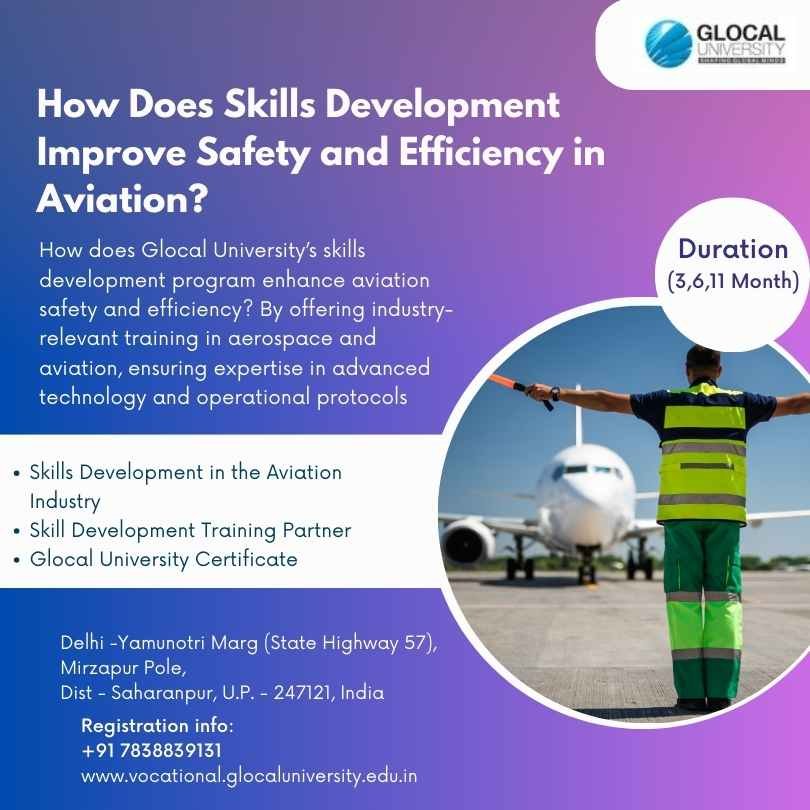The aviation industry is one of the most dynamic and critical sectors globally, requiring highly skilled professionals to ensure its seamless operations. With the rapid pace of technological advancements and increasing air traffic, enhancing safety and operational effectiveness is a top priority. Skill development plays a pivotal role in achieving these goals. Programs like the Skill Development Program in Aerospace and Aviation, offered by institutions such as Glocal University Vocational, are designed to equip individuals with industry-specific expertise, making them competent to satisfy the changing needs of the aviation industry.
1. Enhancing Safety Protocols
Safety is the cornerstone of the aviation industry. Skill development programs train professionals to adhere to stringent safety protocols, reducing the risk of accidents. These programs emphasize critical areas such as aircraft maintenance, emergency response, and adherence to global safety standards. By equipping aviation workers with the knowledge and tools necessary to prevent and respond to emergencies, such initiatives significantly enhance safety in the skies.
2. Improving Operational Efficiency
Operational efficiency is essential for maintaining profitability and customer satisfaction in aviation. Skill development initiatives, such as the Skill Program in Aerospace & Aviation, focus on optimizing workflows in areas like ground handling, cargo management, and flight operations. These programs teach professionals how to use modern technology and data-driven decision-making to streamline processes, reducing delays and costs while ensuring a smooth passenger experience.
3. Adapting to Technological Advancements
The aviation industry is at the forefront of technological innovation, incorporating AI, machine learning, robotics, and advanced navigation systems. Skill development programs ensure that aviation professionals stay updated with these technologies. Training on simulators, drones, and automated systems enables them to operate and manage new technologies effectively, fostering innovation and boosting operational performance.
4. Addressing Workforce Gaps
The global aviation industry faces a persistent shortage of skilled professionals. Skill development programs bridge this gap by providing targeted training tailored to the industry’s needs. By collaborating with vocational training partners, these programs create a steady pipeline of qualified individuals ready to meet workforce demands. For example, Glocal University Vocational partners with leading industry players to provide practical, hands-on experience, ensuring that graduates are job-ready from day one.
5. Enhancing Maintenance and Engineering
Aircraft maintenance and engineering are critical components of aviation safety. Skill development courses focus on providing in-depth training in diagnostics, repair, and preventive maintenance. Programs like the Skill Development Program in Aerospace and Aviation ensure that engineers and technicians are well-versed in the latest tools, technologies, and regulations, minimizing the risk of mechanical failures.
6. Building Competence in Air Traffic Management
Air traffic controllers play a vital role in managing the safe and efficient movement of aircraft. Skill development programs train them in advanced communication systems, radar technology, and traffic flow management. This ensures that air traffic controllers can handle increasing air traffic volumes while maintaining the highest safety standards.
7. Promoting Sustainable Practices
As the aviation industry faces mounting pressure to reduce its environmental impact, skill development programs now include training in sustainable practices. This includes optimizing fuel efficiency, adopting eco-friendly materials in aircraft manufacturing, and implementing green technologies. Professionals trained in sustainability contribute to the industry’s long-term goals of reducing carbon emissions and fostering environmental responsibility.
8. Strengthening Soft Skills
Beyond technical expertise, aviation professionals require strong soft skills such as communication, teamwork, and problem-solving. Skill development courses incorporate training in these areas to prepare individuals for collaborative and customer-facing roles. These skills are particularly vital for cabin crew, ground staff, and customer service representatives.
9. Ensuring Compliance with Global Standards
The aviation industry operates under strict international regulations set by bodies like the International Civil Aviation Organization (ICAO). Skill development programs train professionals to comply with these standards, ensuring global interoperability and safety. Graduates from such programs are better equipped to work in diverse international settings.
10. Empowering Career Growth
Skill development not only enhances job performance but also opens doors for career advancement. Programs offered by vocational training partners provide certifications that are recognized globally, enabling professionals to climb the career ladder. With ongoing skill development, aviation workers can transition to higher roles such as aviation managers, safety inspectors, or technology specialists.
11. Collaborative Industry Partnerships
Collaborations between training institutions and industry leaders enhance the effectiveness of skill development programs. Institutions like Glocal University Vocational work closely with skill development training partners to align their curricula with industry requirements. These partnerships provide students with access to real-world projects, internships, and mentorship, ensuring they are industry-ready upon graduation.
12. Boosting Economic Contributions
A well-trained aviation workforce contributes significantly to the economy by ensuring the smooth functioning of air transportation, which is vital for trade, tourism, and global connectivity. Skill development programs enhance the industry’s capacity to meet growing demand, supporting economic growth and development.
Conclusion
Skill development is a transformative force in the aviation industry, enhancing safety and operational efficiency while preparing the workforce for future challenges. Programs like the Skill Development Program in Aerospace and Aviation, offered by institutions like Glocal University Vocational, play a crucial role in equipping professionals with the skills needed to excel.
From adopting technological advancements to promoting sustainable practices and meeting global standards, skill development is integral to the aviation industry’s success. By investing in training and education, the sector can ensure that it remains a beacon of safety, efficiency, and innovation for years to come.



